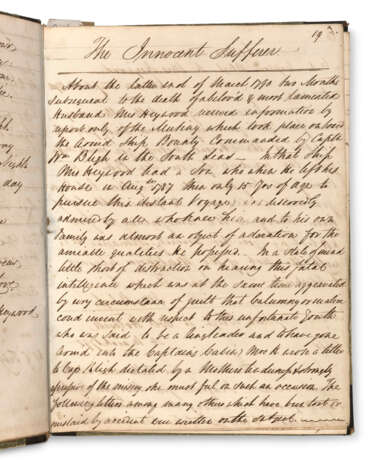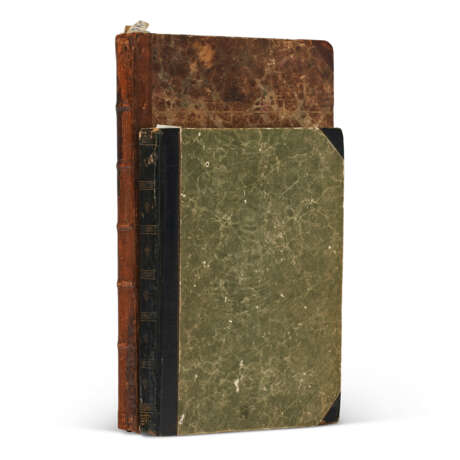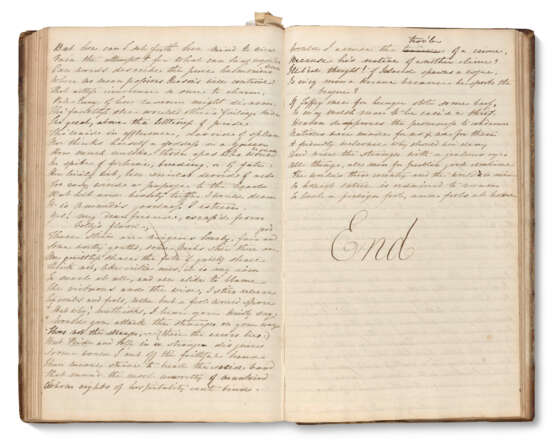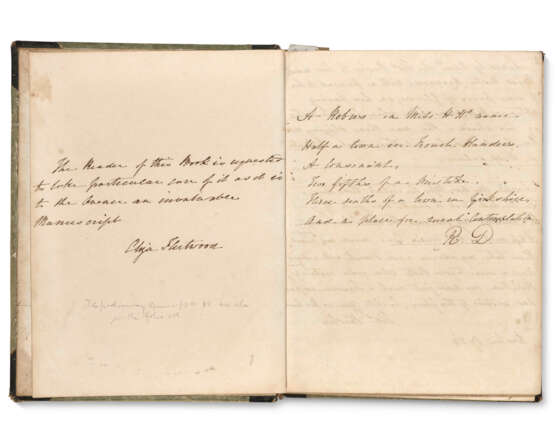ID 813815
Lot 116 | An early archive of correspondence relative to his court martial
Estimate value
$ 40 000 – 60 000
Family of Peter Heywood, ca. 1818
H.M.S. BOUNTY – HEYWOOD, Peter (1772-1831). Bound manuscript, various places, [ca. 1813-1818.]
Two volumes. Vol I: 200 pages in ink and in a variety of hands on paper watermarked 1818, quarto (241 x 185mm). Half green-black roan over green marbled boards; Vol II: 171 pages in ink also in various hands with an additional 27 pages in another hand and in pencil on paper watermarked 1813, folio (323 x 202mm). Half calf, marbled boards (joints cracked).
One of the few extant fair copies of an eyewitness narrative of the infamous Bounty mutiny as recorded by Bligh's midshipman, mutineer Peter Heywood. Written in a series of hands, the narrative is part of a pair of albums that records significant correspondence concerning Heywood's capture, trial, sentence and his commutation from execution stemming from his role in the munity against William Bligh aboard the H.M.S. Bounty. The correspondence includes letters to and from Heywood, his mother Elizabeth, his sister Nessy, his uncles including Sir Thomas Pasley, Colonel Howell and James Modyford Heywood, and others. The albums include Heywood's eyewitness account of the mutiny (including his reasons for remaining aboard ship), his last day in Tahiti and his subsequent arrest, his captivity aboard the Pandora (and the shipwreck), his deposition given at his court-martial as well as trial-related correspondence including letters concerning his appeal and pardon.
Heywood's account of the mutiny is preserved in a letter to his mother on 20 November 1791 following his arrest in Tahiti and his imprisonment and shipwreck aboard the Pandora. "The morning the ship was taken it being my watch below, happening to awake just after day light and looking out of my Hammock I saw a man sitting upon the arms chest in the Main Hatch way with a drawn Cutlass. " This was Matthew Thompson, able seaman, who kept the middle watch. When queried by Heywood, Thompson replied: "Mr. Christian, assisted by some of the ship's company had taken and put the Captain in confinement and had taken the command upon himself and was going to take him home a prisoner to have him tried by a court martial for his long and tyrannical and oppressive behavior to his people!" Once Heywood dressed and went on deck, he discovered an entirely different scenario: "I asked some of the people... what was to be done with the Captain (who was then on the Larboard side of the quarter deck with his hands tied behind his back and Mr. Christian along-side him with a Pistol and drawn Bayonet) most of whom told me quite a different story... which was that he was to be sent to shore to Tofoa in the Launch and those who would not join Christian, might either accompany him or be taken in irons as prisoners to Otaheite and be left there." Heywood explained his reasoning for not joining Bligh in the open boat, "In this trying situation young and quite inexperienced as I was and without any advisor... I remained for a while a silent spectator of what was going on and after resolving the matter clearly within my Mind I was determined to choose the lesser of two evils, because I knew that those who went on shore would in all probability be put to death by the savage natives, whereas the Otaheitians being [a] humane and generous race one might have some hope of being kindly received and remained there until another ship arrived which seemed to me the most consistent with reason and rectitude."
The Heywoods, who were beholden to Bligh for Peter's appointment to the Bounty, appealed to Bligh to use his influence to save their son. Responding to Elizabeth Heywood, he wrote, icily, "being perfectly sensible of the extreme distress you must suffer from the conduct of your son Peter. His baseness is beyond all description, but I hope you will endeavour to prevent the loss of him, heavy as it is ... from afflicting you too severely." Bligh's earlier response to Heywood's uncle was that "[Heywood's] ingratitude to me is of the blackest dye, for I was a father to him in every respect." The letters also cover Heywood's arrest and imprisonment aboard the Pandora, the shipwreck and subsequent rescue and return to England. The manuscript includes Peter's testimony to the court and his challenges to the evidence presented at trial.
Heywood's sister Nessy wrote countless letters to anyone who might listen in support of her brother's defense, but despite her best efforts, the court found Peter Heywood guilty on 18 September 1792 and sentenced to him hang. Soon after he received his sentence, he wrote to Nessy, "Had I not a strong Idea, that e'er this mournful epistle from your ill fated Brother can reach the trembling hand of my ever dear and much afflicted sister Nessy, she must have been informed of the final issue of my Trial on Wednesday morning... Tho' I have indeed fallen an early victim to the rigid Rule of the Service, and tho' the Jaws of Death are once more opened upon me, yet do I not now nor ever will bow to the tyranny of base born Fear … conscious of having done my duty to God and Man, I feel not one Moment's anxiety on my own account but cherish a full and sanguine hope that perhaps a few days more will free me from the Load of Misfortune which has ever been my Portion in this transient period of Existence … and that I shall find an everlasting asylum in those blessed regions of eternal Bliss." Fortunately for Heywood his sister's persistent campaign on his behalf, as well as friends in well-situated places spared his life. In October, Peter received a royal warrant commuting his sentence. In accepting the kindness, he recalled that at the moment "the Sentence of the Law was passed upon me, I received it, I trust, as became a man; and if it had been carried into execution, I should have met my fate, I hope, in a manner becoming a Christian." Appreciating his "Sovereign's Mercy," he pledged that his "future life shall be faithfully devoted to his service." Heywood served in the Royal Navy for 25 years retiring in 1816.
According to Carolina Alexander, writing in her 2004 volume, The Bounty, Nessy Heywood had compiled five copies of her correspondence for the purpose of garnering support for Heywood during his trial and appeal (411). However, the present compilation is much more fulsome, containing as it does, letters from all of the key players at the trial. As the originals of the majority of this correspondence is believed to be lost, this stands as a critical record. Provenance: (quarto volume): Eliza Fleetwood (ownership inscription; (folio volume): E[dwin Holwell] H[eywood] (ownership label) – Sotheby's, New York, 18 June 2004, lot 275.
| Address of auction |
CHRISTIE'S 20 Rockefeller Plaza 10020 New York USA | ||||||||||||||
|---|---|---|---|---|---|---|---|---|---|---|---|---|---|---|---|
| Preview |
| ||||||||||||||
| Phone | +1 212 636 2000 | ||||||||||||||
| Fax | +1 212 636 4930 | ||||||||||||||
| Conditions of purchase | Conditions of purchase | ||||||||||||||
| Shipping |
Postal service Courier service pickup by yourself | ||||||||||||||
| Payment methods |
Wire Transfer | ||||||||||||||
| Business hours | Business hours
|






